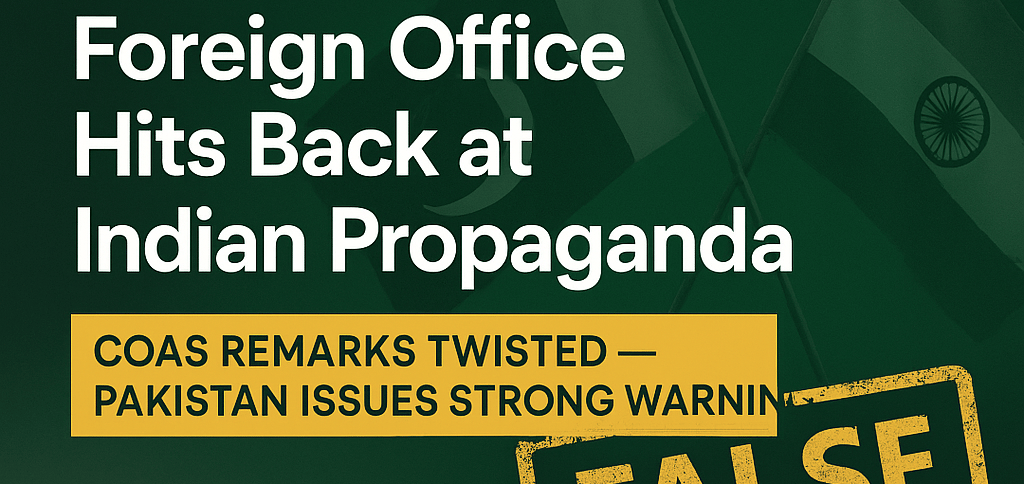Foreign Office Hits Back at Indian Propaganda
COAS Remarks Twisted — Pakistan Issues Strong Warning
NATIONALINTERNATIONAL
8/12/20253 min read


Pakistan Slams India Over Misrepresentation of COAS Asim Munir’s Remarks in US Visit
Islamabad – Pakistan’s Foreign Office (FO) on Monday strongly criticized India’s Ministry of External Affairs (MEA) for what it called a deliberate “distortion” and “manipulation” of statements attributed to Chief of Army Staff (COAS) Field Marshal Asim Munir during his recent diplomatic tour of the United States.
Asim Munir’s Second High-Profile Visit to the US
Field Marshal Munir concluded his second visit to the US in under two months on Sunday. Similar to his earlier trip, the army chief held meetings with senior political leaders and top military officials. While in Tampa, Florida, he attended the US Central Command’s (Centcom) change-of-command ceremony.
Later, he was the guest of honor at a formal black-tie dinner hosted by Pakistan’s honorary consul in Tampa, Adnan Asad. Around 150 dignitaries attended, including Interior Minister Mohsin Naqvi, Ambassador Rizwan Shaikh, embassy staff, and influential members of the Pakistani diaspora.
FO Accuses Indian Media of Twisting Statements
Some remarks allegedly made by Munir during the event were picked up by Indian media, which, according to Pakistan’s FO, misrepresented his words. In response, the Indian MEA issued a statement claiming:
“Our attention has been drawn to remarks reportedly made by the Pakistani COAS while on a visit to the US. Nuclear saber-rattling is Pakistan’s stock-in-trade.”
The MEA further suggested that such comments reflected poorly on Pakistan’s nuclear command integrity, particularly in what it described as a military establishment with ties to militant groups. It also expressed regret that these alleged remarks were made “on the soil of a friendly third country.”
Pakistan’s Strong Rebuttal
The FO dismissed India’s statement as “immature” and “factually misleading,” accusing New Delhi of repeatedly distorting facts and taking comments out of context.
“Pakistan firmly rejects the fabricated narrative of so-called ‘nuclear blackmail.’ Our country remains committed to peaceful resolutions and opposes the use or threat of force,” the FO said.
It emphasized that Pakistan is a responsible nuclear power with a robust, civilian-controlled command-and-control framework, and that it has always exercised restraint in sensitive matters.
Counterterrorism Efforts Acknowledged Globally
The FO also underscored that Pakistan’s counterterrorism initiatives are internationally recognized, noting that its security forces are the primary line of defense against extremism. It rejected India’s “baseless insinuations” as unfounded and politically motivated.
Furthermore, the FO criticized India’s attempt to involve “third countries” in bilateral matters, calling it a sign of New Delhi’s “lack of diplomatic maturity.”
Warning Against Indian Aggression
While reaffirming Pakistan’s commitment to global peace and responsible conduct, the FO warned:
“Any Indian aggression or violation of Pakistan’s sovereignty will be met with an immediate and proportionate response. Responsibility for any escalation will rest entirely with the Indian leadership.”
Background: Military Escalation Earlier This Year
Tensions between the two nuclear-armed neighbors spiked earlier this year when India blamed Pakistan—without presenting evidence—for the April 22 Pahalgam attack. In retaliation, India launched airstrikes on May 6–7, killing civilians. Pakistan’s Air Force responded by shooting down six Indian fighter jets and striking Indian airbases.
The standoff ended on May 10 following direct intervention from the United States, with then-President Donald Trump publicly taking credit for brokering the ceasefire.
US-India Relations Strained After Ceasefire
Following the conflict, New Delhi expressed dissatisfaction over Washington’s perceived closeness to Islamabad. Despite previous camaraderie between Trump and Indian Prime Minister Narendra Modi, India has recently taken a firmer stance toward the US.
Trump has openly criticized India’s trade policies, tariffs, and continued energy imports from Russia. Last week, he escalated economic pressure by imposing an additional 25% tariff on Indian exports, set to take effect in three weeks. This move will raise some duties to as high as 50%, among the steepest for any US trade partner, effectively stalling ongoing trade negotiations.
Outlook for Pakistan-India-US Triangle
The FO’s recent statements signal that Islamabad is unwilling to let India’s narrative go unchallenged. With trade disputes straining US-India ties and lingering mistrust between Islamabad and New Delhi, the coming months may see a more complex geopolitical alignment in South Asia.
Explore
Your lens into Pakistan's vibrant stories.
Connect
Discover
+92-300-0440097
© 2025. All rights reserved.
